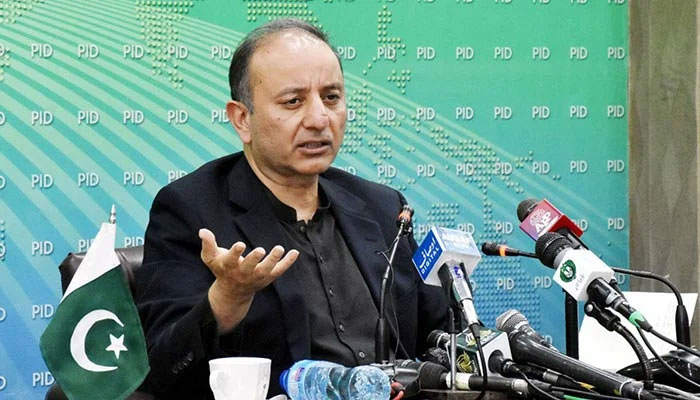IMF should not object to discounted fuel plan: Musadik
“Since the rich will finance the poor for discounted fuel, the IMF should not have any objection,” Malik says
ISLAMABAD: State Minister for Energy Musadik Masood Malik Wednesday said the IMF should have no objection to the government’s discounted fuel programme that will benefit the poor by charging Rs50 per litre more from the affluent.
“Since the rich will finance the poor for discounted fuel, the IMF should not have any objection,” Malik said while speaking to the reporter here.
Asked if it was not an injustice to categorize the owner of an old 1,500cc car valued at maximum Rs1.5 million as rich and the owner of a new 660cc car valued at Rs3.2 million as poor, Malik said in the first phase, they will give blanket relief to the owners of up to 800cc cars, while in the second phase they will consider the value and models of cars. He said around 51 percent of the population will benefit from the subsidized fuel that consumed 60 percent of the country’s total fuel consumption.
This program will target around 20 million motorcycles and rickshaws (with capping of 21 liters of petrol per month) and 1.36 million small vehicles (capping of 30 liters of fuel). This program will be for motorcycles, rickshaws and up to 800cc cars. It will be finalized within six weeks and submitted to Prime Minister Shehbaz Sharif for approval.
The proposed two-tier pricing strategy would aim at taxing Rs50/litre tax to the luxury cars owners. The government intends to fund this subsidy by charging an additional fee of Rs50/litre for every liter of petrol bought by the wealthy car owners.
Explaining the mechanism, the minister said the Oil and Gas Regulatory Authority (Ogra) will determine two different prices for the rich and the poor.
For example, if the petrol price is Rs300/litre, the rich will pay Rs50/litre extra and will be charged Rs350/litre. The Rs50/litre charged from the rich consumers will be transferred to the targeted poor consumers and they will get petrol at Rs250/litre. Actually, the poor will get Rs100/liter discount.
Asked whether the program was covered legally, as it could be challenged in the court of law for being discriminatory, the minister replied, “We have foreseen no court cases in two tier tariffs by the rich.”
Replying to a query that the finance ministry had opposed the petrol relief package, the minister said no one had opposed it and clarified that there was not a penny of subsidy involved in the package. He further said the Ogra would review fuel pricing fortnightly and additional fuel price charged from the rich would be deposited by the oil marketing companies (OMCs) in a dedicated escrow account in the National Bank. The collection would be audited.
The minister said it had been proposed that the escrow account will be opened in the National Bank of Pakistan and the extra money charged from the rich consumers will be deposited in that account which will be disbursed to the petrol pumps later on.
-
 Kanye West's Last Measure To Save Bianca Censori Marriage As He Tries To Salvage Image
Kanye West's Last Measure To Save Bianca Censori Marriage As He Tries To Salvage Image -
 Kim Kardashian Finally Takes 'clear Stand' On Meghan Markle, Prince Harry
Kim Kardashian Finally Takes 'clear Stand' On Meghan Markle, Prince Harry -
 Christina Applegate Makes Rare Confession About What Inspires Her To Keep Going In Life
Christina Applegate Makes Rare Confession About What Inspires Her To Keep Going In Life -
 Patrick J. Adams Shares The Moment That Changed His Life
Patrick J. Adams Shares The Moment That Changed His Life -
 Selena Gomez Getting Divorce From Benny Blanco Over His Unhygienic Antics?
Selena Gomez Getting Divorce From Benny Blanco Over His Unhygienic Antics? -
 Meet Arvid Lindblad: Here’s Everything To Know About Youngest F1 Driver And New Face Of British Racing
Meet Arvid Lindblad: Here’s Everything To Know About Youngest F1 Driver And New Face Of British Racing -
 At Least 30 Dead After Heavy Rains Hit Southeastern Brazil, 39 Missing
At Least 30 Dead After Heavy Rains Hit Southeastern Brazil, 39 Missing -
 Courtney Love Recalls How ‘comparison’ Left Marianne Faithfull ‘broken’
Courtney Love Recalls How ‘comparison’ Left Marianne Faithfull ‘broken’ -
 Pedro Pascal Confirms Dating Rumors With Luke Evans' Former Boyfriend Rafael Olarra?
Pedro Pascal Confirms Dating Rumors With Luke Evans' Former Boyfriend Rafael Olarra? -
 Ghost's Tobias Forge Makes Big Announcement After Concluding 'Skeletour World' Tour
Ghost's Tobias Forge Makes Big Announcement After Concluding 'Skeletour World' Tour -
 Katherine Short Became Vocal ‘mental Illness’ Advocate Years Before Death
Katherine Short Became Vocal ‘mental Illness’ Advocate Years Before Death -
 SK Hynix Unveils $15 Billion Semiconductor Facility Investment Plan In South Korea
SK Hynix Unveils $15 Billion Semiconductor Facility Investment Plan In South Korea -
 Buckingham Palace Shares Major Update After Meghan Markle, Harry Arrived In Jordan
Buckingham Palace Shares Major Update After Meghan Markle, Harry Arrived In Jordan -
 Demi Lovato Claims Fans Make Mental Health Struggle Easier
Demi Lovato Claims Fans Make Mental Health Struggle Easier -
 King Hospitalized In Spain, Royal Family Confirms
King Hospitalized In Spain, Royal Family Confirms -
 Japan Launches AI Robot Monk To Offer Spiritual Guidance
Japan Launches AI Robot Monk To Offer Spiritual Guidance




